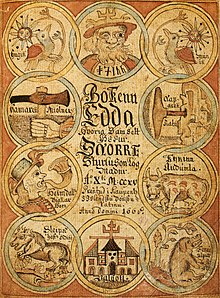Edda
![]()
This article is about the poetry of the Edda; for other meanings of the same name, see Edda (disambiguation).
The Edda is the name given to two different literary works written in the Old Icelandic language. Both were written in Christianized Iceland in the 13th century and deal with Scandinavian sagas of gods and heroes. Despite these similarities, they differ in origin and literary character.
Originally, this name was given to only one work - the Snorra-Edda by Snorri Sturluson († 1241) - which he wrote around 1220 for the Norwegian king Hákon Hákonarson and the Jarl Skúli. It is a textbook for skalds (the Old Norse term for "poets") and is divided into three parts, the first two of which retell the mythological and legendary material foundations of skald poetry in prose, using old mythological songs and heroic songs. The third part, the "Strophenverzeichnis", provides an example stanza for each stanzaic form. In this work he often inserts as examples single stanzas or short sequences of stanzas from old songs. Thus, songs of uncertain age are handed down here quite incidentally.
The second work, called the Song Edda, was not so named until the late Middle Ages, but the name has become established and is considered the better known Edda: around 1270 a collection of songs of various ages was written down in Iceland. Some of the stanzas quoted by Snorri agree with it almost verbatim. This collection, however, transmits whole songs, not only excerpts, and connects only very few texts by content details in prose.
To distinguish the two works from each other, the literature refers to them as the Snorra Edda and the Song Edda. Due to the assumption that the texts of the Song Edda were for the most part already known to Snorri, the Song Edda is often also referred to as the "Older Edda" and the Snorra Edda as the "Younger Edda". However, since the collection of songs was probably compiled after the Snorra Edda was published, these names are confusing and are avoided today. It is also doubted whether the collection of songs in the Edda is so old that it could date back as far as Saemund the Wise; the name Sæmundar-Edda, by which it was often called until the 19th century, is therefore probably incorrect. Since the Snorra-Edda, although its continuous text is written in prose, contains a great many stanzas as examples, and the Song-Edda, though few, contains some prose texts between the stanzas, it is also inconvenient to call the Snorra-Edda the "Prose Edda" and the Song-Edda the "Poetic Edda."

Cover page of an Icelandic copy of the Snorra-Edda from 1666
Meaning of the name
The etymology of the word Edda is uncertain. Probably it is simply the Nordic translation of the Latin word editio, in German Herausgabe, Edition. In the Orkneyinga saga we find the Icelandic word Kredda for the Latin word Credo for faith, also Christian creed.
See also: Snorra-Edda#The name Edda
Snorra-Edda ("Prose Edda")
→ Main article: Snorra-Edda
The Snorra-Edda or "Prose Edda" was compiled around 1220 by Snorri Sturluson using ancient traditions. It consists of three parts:
- the Gylfaginning ("Deception of Gylfi"), in which the Norse world of gods is presented in detail;
- the Skáldskaparmál ("Doctrine of Poetry", literally "skaldship"; skalds were called professional poets), a doctrinal essay for skalds. He also refers to songs that are part of the Song-Edda, quoting verses and stanzas from them. In the Skáldskaparmál, among other things, the kenningar are explained, poetic rewritings of words that mostly allude to events in the sagas of the gods;
- the Háttatal ('stanzaic catalogue'), which brings an example stanza for each stanzaic form. These stanzas, which Snorri wrote himself, together form a praise song to King Hákon and Jarl ('Duke') Skuli.
Search within the encyclopedia